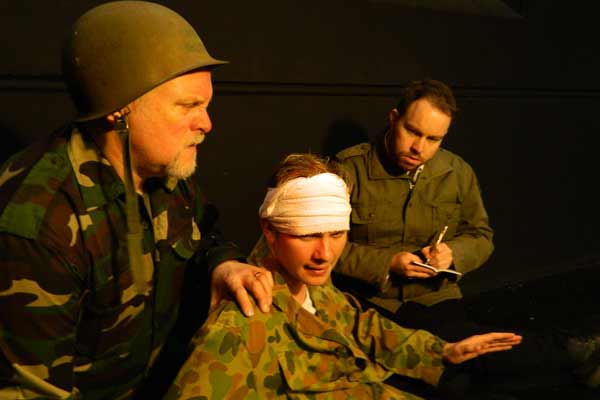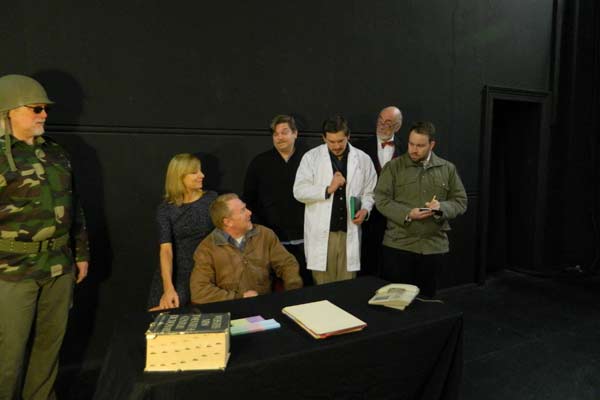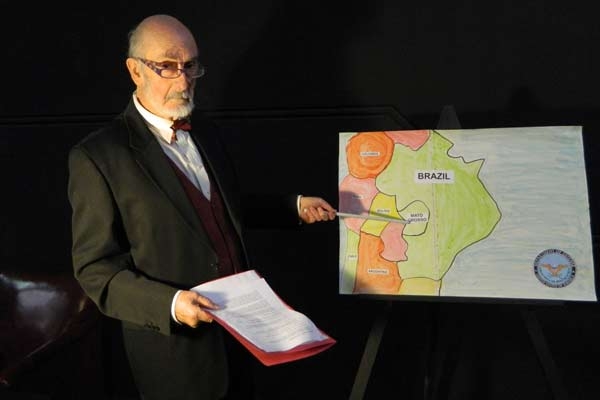Impeachment proceedings have been commenced, the Doomsday Clock inches forward and Russian espionage dominates the nightly newscasts; we could be describing the late 1960s or 2017.
Jules Feiffer’s 'The White House Murder Case' was written during the previous nadir of US politics, a time when Tricky Dicky was the leader of the free world. We speak to Eddy Knight, the Director of Red Phoenix Theatre’s production of the political satire, about the renewed relevance of the work.
Do you think your play will provide catharsis for those still struggling to comprehend Donald Trump’s presidential victory?
Jules Feiffer wrote 'The White House Murder Case' at the height of the Vietnam War, during Richard Nixon’s presidency. He was horrified by that senseless war and also by the political chicanery of the Nixon administration which later culminated in the Watergate Scandal, the trial of 69 of his top officials and his own resignation rather than face impeachment. Feiffer set the play forty years into the future to avoid legal attack from such a corrupt administration. Now, 40 years later we are living with an American president who constantly attacks the free press, practices nepotism, wants a wall to keep out Mexicans, demonises Muslims, lied about Obama and others of his political opponents, demeans women, denies climate change and will be remembered for coining the phrase ‘fake-news’. In effect a bully who, like Nixon before him, considers his position to be above the law – the perfect president for an era of ‘post-truth’. In such an era Feiffer’s cartoon-like play comes rampaging back into relevance. As a supreme satirist Feiffer manages to create a play that is frankly hilarious, using comedy to ‘speak truth to power’. For those of us astounded by Trump’s elevation and bemused by his subsequent executive orders, this play hopefully offers some relief as it presents the only sane response to such maladministration – laughter – the one thing that bullies fear the most.

The play was written and first performed in the midst of the Vietnam War and before the emergence of the 24/7 news networks. Have you adapted the work in any way to factor in the changes of the past four decades or have you remained entirely faithful to the original text?
Although written over 40 years ago I believe that there is such a contemporary relevance that I have remained faithful to the original text. We could have rewritten parts of the play to incorporate such advances as the use of mobile phones, but really it is the message that is important. Political chicanery has been with us since the time of the ancient Greeks, and satirising it has been the job of playwrights since Aristophanes. The catharsis afforded to the public by showing up the dirty washing of their supposed betters is just as valuable as that provided by the tragedies of Sophocles. Besides this there are the happy accidents of the contemporary relevance of such lines as “the Russians won’t mind, they understand American politics”.
Jules Feiffer used many satirical mediums, including political cartoons. How do you think his background as a cartoonist informed his style as a playwright?
I grew up appreciating the political cartoons of Jules Feiffer which were syndicated throughout American magazines and newspapers, and also appeared in the Observer newspaper in Britain. As he himself said, he was better at dialogue and at creating characters and situations than he was at artwork. It was thus perhaps inevitable that he should turn to play and script-writing whilst continuing to draw cartoons well into his eighties. It is easy to see the influence of his cartoon style on The White House Murder Case, as well as that of Absurdist playwrights like Ionesco and Beckett.

As a director, you have been mentored by the great John Bell and State Theatre’s David Field. Can you distil the most important lessons your learnt from these mentors?
I have been lucky enough to work with and been given advice by a number of truly great directors. Amongst other things David Field taught me how to play poker! 'Dealer’s Choice' depended ultimately on the actors really knowing the game so we always started rehearsals by playing. More importantly the importance of creating a mutually supportive environment between everyone in the rehearsal room. I was initially in awe of John Bell but found him to be one of the friendliest of people, and amazingly encouraging to anyone wanting to learn. I guess the biggest lesson I learnt from him was the advantage of an ensemble, the ability to have total trust in your actors. Steven Berkoff, with whom I once did a workshop and then talked with every time he came back to Adelaide, told me that if I saw something I liked in someone’s else’s work to go ahead and steal it as ‘everyone else does'. Howard Barker, whom I consider to be the unsung genius of contemporary theatre, and with whom I have worked both in the U.K. and here, provided me the supreme example of a man standing up for his own artistic vision, however isolated from the mainstream he might be.






